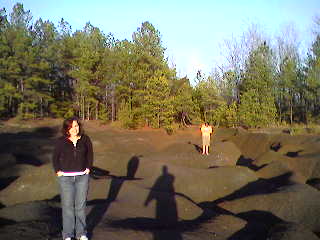

As many local residents already know, Decatur County truly is
the “Outdoor Capital of Tennessee,” but this
distinction goes far beyond the prerequisite recreational sports of
boating, hunting and fishing. The county's terrain provides a wide
variety of archeological opportunities for family fun, education
and the chance to coax kids away from video games and out into the
natural world. In the northern part of Decatur County, at the
intersection of Yellow Springs Road and Jeanette Holliday Road,
lies a spot of land that literally defies description: Imagine
stepping into a field that resembles the landscape of another
planet. The relatively small parcel of land is unique because it
contains and produces selenite crystals – a form of the
common mineral gypsum that crystallizes due to a precise and
uncommon combination of geological properties for this area of the
country. The crystals take on the characteristics of the soil, with
finer soil producing clearer crystals. The Decatur County selenite
crystals have a bluish cast and are relatively clear. The Pink
Palace Museum in Memphis and the Geology Department at the
University of Tennessee at Martin conducted a joint geological
survey of the property in 2006. The land receives frequent visitors
from universities and geological societies interested in the
anomalous deposits. The largest deposits of gypsum were formed
during the Permian geological era, about 270 million years ago. The
Yellow Springs Road selenite landscape consists of black, barren
rolling hills and deep trenches covered with selenite crystals that
form on top of the dry crusty soil of the undisturbed hilltops.
They sometimes grow in a star-shaped pattern that serious
collectors try to preserve and reassemble at home as prized
specimens. “Decatur County is world renowned for its fossil
deposits and sites,” said WC McDaniel, president of the
Memphis Archaeological and Geological Society. “The fossils
dating back over 400 million years are abundant and of high
quality; the selenite site is also well known.” The deposit
is located on private land owned by the late Dr. James Cole and his
wife, Melba, of Memphis. Dr. Cole was a successful chiropractor and
an avid rock hound. Dr. Cole served as president of the state
licensing board for chiropractors and was a member of the Memphis
Archeological and Geological Society and the Eastern Federation of
Mineralogical and Lapidary Societies. Melba states that everyone is
most welcome to visit the land and see the amazing selenite
deposits. “But don't dig it,” she cautioned. “It
forms on top of the ground and it must be gathered.”
To log this cache, you should post a picture of you with your
GPSr at the Selenite field and also the length of the longest
visible intact crystal at ground zero.
